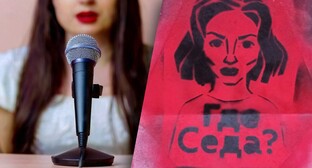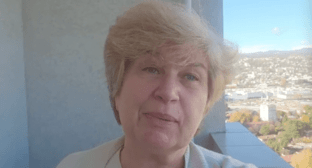24 March 2004, 09:36
Anti-war meeting trial details
On March 17, Moscow's Meshchansky District Court heard on an administrative case against Nikolai Khramov, secretary of Russian Radicals and an organizer of a meeting for peace and democracy in Chechnya.
Timed to the anniversary of Stalin's deportation of the Chechens and Ingushetians, the meeting in Lubianskaia Square had been scheduled for February 23 this year. However, authorities banned the undertaking, and police detained the people. Nikolai Khramov was accused of breaking the established procedure for organizing and conducting meetings under Article 20.2 of the Code of Administrative Offenses.
The trial was held in public. While the process was still on, though, all those who were not directly related to the case were turned out. The only exception was made for the press. The judge disliked that one of the people present disturbed the silence. By the way, Nikolai Khramov evaluated this as a violation of the principle of public trial. He was declared guilty and liable to pay a fine of 1,500 rubles. A similar verdict had been passed the day before with regard to Lev Ponomarev, executive director of the Movement for Human Rights and another organizer of the meeting on February 23.
Nikolai Khramov: It would have been stupid to expect a revolutionary decision on this case that would match the Constitution and contradict the unlawful practice of many years.
I am charged with breaking the procedure to organize meetings. Yet the trouble is there is no legally established procedure to organize meetings in this country. Article 31 of the Constitution guarantees everyone's right to peaceful, unarmed assembly to hold meetings, processions, demonstrations, and pickets. Article 55 says the rights and freedoms guaranteed by the Constitution can be restricted in certain cases, but only by a federal law. Meanwhile, there is no federal law restricting the right of assembly. There is an interim provision on meetings, demonstrations, and pickets in Moscow approved by a presidential decree in 1993. This is a by-law, not a law, but even so the prefecture broke it.
The gist of this interim provision is that a notification must be lodged to organize a meeting. It also indicates the reasons for denial of acceptance of the notification. Overall, I believe this interim provision an attempt to combine the incompatible, i.e. both a notifying and actually permissive nature. Yet, they are obliged to consider the notification and provide legal grounds for denial. Meanwhile, we received an odd letter from the prefecture that indicated our notification could not be considered. This is just nonsense from the legal standpoint.
Caucasian Knot: Why don't we have a federal law on meetings, as you think?
N.Kh.: You know, there are a lot of laws we don't have - for example, on alternative civilian service. Unfortunately, our legislation is extremely imperfect. We therefore to a limited extent provoked the court's negative decision. It can now be appealed in the Moscow City Court, then in Strasbourg. This is how a court case is made. We are not here to prove we mustn't be fined 1,500 rubles. We want a court of law to confirm: Russian citizens have the constitutional right of free assembly that cannot be restricted by a prefecture or police in the absence of a federal law.
CK: Your meeting was timed to the anniversary of Stalin's deportation of the Chechens and Ingushetians?
N.Kh.: It was, but it was just one in a series of actions held that day in more than 30 capitals around the world. The meeting had clearly outlined goals. Firstly, commemoration of victims of the 1944 genocide which I believe is on even now. Besides, we wanted to demand a political settlement of the conflict in Chechnya and to support the so-called peaceful "Akhmadov Plan" containing a proposal for the establishment of a UN interim administration in Chechnya.
CK: When did the idea to establish a UN administration in Chechnya occur?
N.Kh.: It was first expressed by Ilias Akhmadov, Foreign Minister at Maskhadov's government, in his "Peace Plan" titled "Conditioned Independence under International Governance." The plan was presented in Washington, DC, USA, in April last year. By the way, we were collecting signatures in support of Akhmadov's Plan. We already have 20,000 signatures.
CK: I know such work is handled not only in Russia, but statistics show people in this country display the lowest activity. Are you concerned about that?
N.Kh.: I am. It means only that our operation is very poor. Those willing to collect signatures are few, not those willing to sign. But when we finally organized collection of signatures in Pushkin Square, people came up to us about every minute.
CK: Could this action be the reason to ban the meeting?
N.Kh.: It's hard to say. At first we thought banning the meeting is just authorities' playing safe to avoid disturbing Chechnya before the elections. But now it seems to be developing into a regrettable tradition. Thus, a weekly picket against war in Chechnya in Pushkin Square was recently closed down. This causes joyless thoughts. Strangely enough, however, banning the meeting in Lubianskaia Square caused most trouble to those who banned it. Our failed activity received a much more widespread resonance than a usual anti-war meeting. We received coverage from all government TV channels, all radio stations and electronic and print media.
CK: Do you believe in a political and peaceful settlement of the conflict in Chechnya?
N.Kh.: Absolutely. All wars end sooner or later. I am sure a political settlement will be found. However, it mustn't leave the people of Chechnya to the mercy of fate like it was in 1996. Their rights, freedom and democracy must be ensured. But only the international community is capable of that presently.
It should be noted Khramov's defense was organized by Karina Moskalenko, head of the International Protection Center. Moskalenko's field of concentration is international public law, in particular, international human rights advocacy. In this latter area she was awarded the Honorary Sign of the Commissioner on Human Rights in the Russian Federation and Themis-2000, a prestigious prize set up by the Moscow Lawyers Club. Moskalenko said Khramov's detention had been illegal, because there is no legal procedure to organize meetings at all in Russia; she asked the court to withdraw the action. The court decision makes no references to constitutional norms. Karina Moskalenko told the Caucasian Knot correspondent she was going to use this argument when appealing to the Moscow City Court.
Karina Moskalenko: The Meshchanskii Court gave no evaluation of the defendant's arguments as regards the fact that there is no legal procedure to organize meetings. It is impossible to break something that doesn't exist. We must therefore necessarily appeal against this decision. We are going to do this within 10 days. The verdict was passed in total contravention of constitutional norms and requirements of the European Convention. If the Moscow City Court overrules the decision and develops other practice, our goal will be achieved. If not, we have the right to address the European Court of Human Rights after we receive the decision from the court of appeal.
CK: Are you going to appeal to the Supreme Court?
K.M.: No. This court does not provide effective protection. Effective protection suggests the right of trial. Meanwhile, the Supreme Court as a rule decides in absentia. As for the European Court, such questions have been settled more than once there. There has been no practice on Russia, though. But we know the practice in other states. It boils down to that restrictions cannot be arbitrary. The case will not stand a trial in the European Court. Russian legislation will then be brought in line with the International Convention.
CK: To the best of my understanding, this is what your goal consists in?
K.M.: It is. This is what I've been doing all the past years. I obtain judgments from the European Court to correct the Russian court system at least this way. Because the European Court's decisions are binding for this country. They will not judge whether or not Nikolai Khramov committed an administrative wrong-doing. The European Court will consider if the state's interference in the right of opinion, meetings, peaceful processions and demonstrations is proportional. I believe authorities have not fulfilled their duty as regards observing this right, which means Nikolai Khramov must be declared a victim to violation of Articles 10 and 11. Today's trial has shown there are no effective means of legal protection in this country.
Editors note: See also the article "Court imposes fine on organizer of antiwar picket".
Author: Ksenia Ladygina, CK correspondent Source: Caucasian Knot




